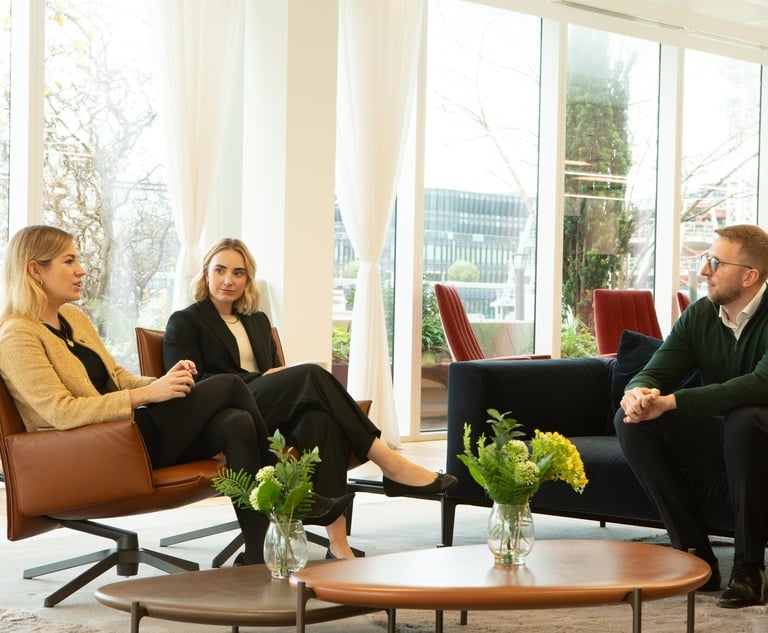A Noble Struggle: How Gender Held Back The Legal Ambitions Of A Mother Of Three
This International Women's Day, former A&O lawyer and mother-of-three Julia Noble reveals her early experiences and how attitudes are changing towards working parents.
March 08, 2019 at 04:31 AM
6 minute read
Julia Noble was an ambitious young female lawyer in the 1990s. City law was booming and she joined Allen & Overy with her sights set for the top. But pretty soon it was clear who at the top was wearing the trousers at the time – and it was not the female staff.
Through the next 17 years, she hit one glass ceiling after another as she became a mother of three, attempted a work-life balance that was frowned on at the time, went from full-time to part-time, and switched from private practice to in-house. Finally, 12 years ago, she decided enough was enough and left the law to pursue her passion for art, taking up a foundation course followed by a full degree.
"I do wonder what I'd be doing now if I had gone into the legal profession 15 years later than when I did – I do think it would be different," she says. Referring to her time as a trainee, she adds: "Back then, we weren't even allowed to wear trousers."
 Julia Noble
Julia NobleIt was obvious on return from her second stint of maternity leave around 1998 that at the time, motherhood was a serious career breaker.
"Back then, we weren't even allowed to wear trousers"
On her return, she found some of her colleagues had left the firm, leading her to ask to work four days a week. And she got it.
"There were no other fee-earners in my department working part-time and I think that was the case in other departments too. It was therefore quite forward-thinking of the partners that I worked for at the time.
"But the problem was that, at that time, as soon as I was working part-time, no one would even consider me as a candidate for partnership. I could see my peers progress and I knew that the partnership option was not available to me."
It was the era of office face-time and Noble recalls that her colleagues' attitudes towards her leaving the office at 6pm to work from home and care for her children were not that supportive. She says they found it hard to believe that she continued to work after physically leaving the office.
"I do recall that in one assessment I was told that there was a perception among others in the office that I was not pulling my weight in my team. I challenged this: I asked if there were any specific incidents but there weren't. Because perceptions and actual incidents are completely separate things."
Noble says she felt a great sense of responsibility to set an example for other women that it could be done – at least to the extent that the glass ceiling permitted.
"As soon as I was working part-time, no one would even consider me as a candidate for partnership"
After returning from her third maternity leave in 2001, she found a large number of her colleagues had progressed up the career ladder. Frustrated at her limited prospects in private practice as the firm approached its next promotion round, Noble left to go in-house at one of her banking clients and joined them permanently a year later.
For a mother-of-three seeking a career ladder, this proved no better. Although she led the team for several years, she was told this could not be a permanent leadership position because she worked part-time.
"Again I felt I had hit a glass ceiling, and after five years at the bank I decided to leave.
"I then went back to A&O for a while as a consultant doing professional support work. But working three short days meant that I hardly got to experience the social element of the job," she says.
Noble quit the job and went to study art.
"I just thought: life is too short, and it was time for me to do other things," she says.
 Julia Noble's artwork
Julia Noble's artworkNowadays, A&O is a different place. Like many firms, it has a raft of initiatives aimed at female progression, such as shared parental leave and flexible-working policies. The firm states that working part-time does not prevent promotion to partnership.
But back in her time, Noble believes that one of the key problems was the perception that clients would disapprove of their legal advisers working part-time. However, having been on the other side of the table as a client, she saw first-hand that this wasn't the case, and that clients would not hold this against their law firms.
She feels this misperception blights the industry, and some law firms still believe that clients would shun them for encouraging flexible working. She says that people tend to forget that a good number of working people are in the same boat; clients are often themselves working mothers and fathers, and are united in the fight to allow greater working freedom for parents.
Her husband Ray Berg continued in the legal profession. He joined Osborne Clarke in 2001 and is now managing partner.
Noble says she noticed a change in Berg's freedoms as a father when he moved to Osborne Clarke. She says the firm's "general ethos" is better for working parents, and believes they recognise that lawyers do have a life beyond work.
"There's so much female talent out there that is still getting lost"
She believes there have been significant improvements made by law firms. The technology has improved substantially, allowing home working to be much more efficient and enabling more lawyers to work flexibly and take up part-time positions. There are also a number of schemes in place to enable women to progress up the career ladder even while juggling parenthood.
But Noble says there are still too few female partners, and there are many issues on diversity that we still need to overcome: "There's so much female talent out there that is still getting lost."
This content has been archived. It is available through our partners, LexisNexis® and Bloomberg Law.
To view this content, please continue to their sites.
Not a Lexis Subscriber?
Subscribe Now
Not a Bloomberg Law Subscriber?
Subscribe Now
NOT FOR REPRINT
© 2025 ALM Global, LLC, All Rights Reserved. Request academic re-use from www.copyright.com. All other uses, submit a request to [email protected]. For more information visit Asset & Logo Licensing.
You Might Like
View All
Paul Weiss Says Progress Means 'Embracing the Uncomfortable Reality'
5 minute read

GCs Say They are Getting 'Edged Out' of UK Boardrooms
Trending Stories
- 1On the Move and After Hours: Meyner and Landis; Cooper Levenson; Ogletree Deakins; Saiber
- 2State Budget Proposal Includes More Money for Courts—for Now
- 3$5 Million Settlement Reached With Stone Academy
- 4$15K Family Vacation Turned 'Colossal Nightmare': Lawsuit Filed Against Vail Ski Resorts
- 5Prepare Your Entries! The California Legal Awards Have a New, February Deadline
Who Got The Work
Michael G. Bongiorno, Andrew Scott Dulberg and Elizabeth E. Driscoll from Wilmer Cutler Pickering Hale and Dorr have stepped in to represent Symbotic Inc., an A.I.-enabled technology platform that focuses on increasing supply chain efficiency, and other defendants in a pending shareholder derivative lawsuit. The case, filed Oct. 2 in Massachusetts District Court by the Brown Law Firm on behalf of Stephen Austen, accuses certain officers and directors of misleading investors in regard to Symbotic's potential for margin growth by failing to disclose that the company was not equipped to timely deploy its systems or manage expenses through project delays. The case, assigned to U.S. District Judge Nathaniel M. Gorton, is 1:24-cv-12522, Austen v. Cohen et al.
Who Got The Work
Edmund Polubinski and Marie Killmond of Davis Polk & Wardwell have entered appearances for data platform software development company MongoDB and other defendants in a pending shareholder derivative lawsuit. The action, filed Oct. 7 in New York Southern District Court by the Brown Law Firm, accuses the company's directors and/or officers of falsely expressing confidence in the company’s restructuring of its sales incentive plan and downplaying the severity of decreases in its upfront commitments. The case is 1:24-cv-07594, Roy v. Ittycheria et al.
Who Got The Work
Amy O. Bruchs and Kurt F. Ellison of Michael Best & Friedrich have entered appearances for Epic Systems Corp. in a pending employment discrimination lawsuit. The suit was filed Sept. 7 in Wisconsin Western District Court by Levine Eisberner LLC and Siri & Glimstad on behalf of a project manager who claims that he was wrongfully terminated after applying for a religious exemption to the defendant's COVID-19 vaccine mandate. The case, assigned to U.S. Magistrate Judge Anita Marie Boor, is 3:24-cv-00630, Secker, Nathan v. Epic Systems Corporation.
Who Got The Work
David X. Sullivan, Thomas J. Finn and Gregory A. Hall from McCarter & English have entered appearances for Sunrun Installation Services in a pending civil rights lawsuit. The complaint was filed Sept. 4 in Connecticut District Court by attorney Robert M. Berke on behalf of former employee George Edward Steins, who was arrested and charged with employing an unregistered home improvement salesperson. The complaint alleges that had Sunrun informed the Connecticut Department of Consumer Protection that the plaintiff's employment had ended in 2017 and that he no longer held Sunrun's home improvement contractor license, he would not have been hit with charges, which were dismissed in May 2024. The case, assigned to U.S. District Judge Jeffrey A. Meyer, is 3:24-cv-01423, Steins v. Sunrun, Inc. et al.
Who Got The Work
Greenberg Traurig shareholder Joshua L. Raskin has entered an appearance for boohoo.com UK Ltd. in a pending patent infringement lawsuit. The suit, filed Sept. 3 in Texas Eastern District Court by Rozier Hardt McDonough on behalf of Alto Dynamics, asserts five patents related to an online shopping platform. The case, assigned to U.S. District Judge Rodney Gilstrap, is 2:24-cv-00719, Alto Dynamics, LLC v. boohoo.com UK Limited.
Featured Firms
Law Offices of Gary Martin Hays & Associates, P.C.
(470) 294-1674
Law Offices of Mark E. Salomone
(857) 444-6468
Smith & Hassler
(713) 739-1250










